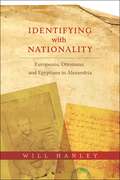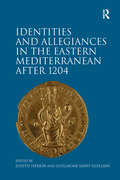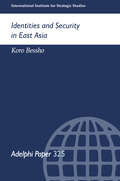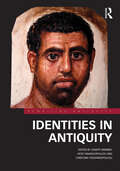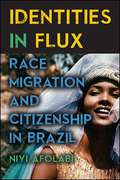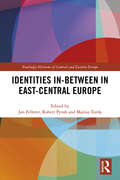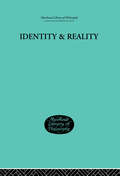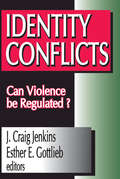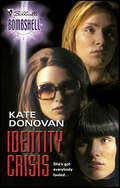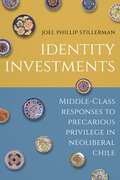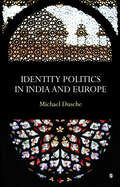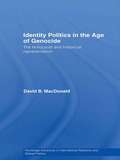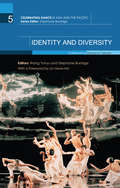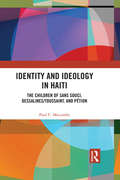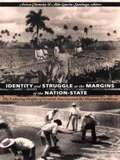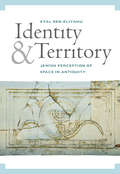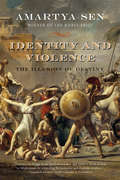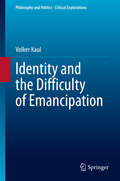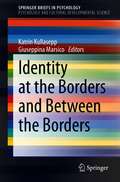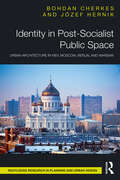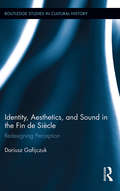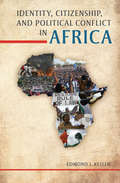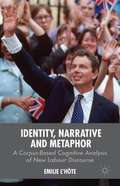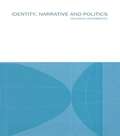- Table View
- List View
Identifying with Nationality: Europeans, Ottomans, and Egyptians in Alexandria (Columbia Studies in International and Global History)
by Will HanleyNationality is the most important legal mechanism sorting and classifying the world's population today. An individual's place of birth or naturalization determines where he or she can and cannot be and what he or she can and cannot do. Although this system may appear universal, even natural, Will Hanley shows that it arose just a century ago. In Identifying with Nationality, he uses the Mediterranean city of Alexandria to develop a genealogy of the nation and the formation of the modern national subject.Alexandria in 1880 was an immigrant boomtown ruled by dozens of overlapping regimes. On its streets and in its police stations and courtrooms, people were identified by name, occupation, place of origin, sect, physical description, and other attributes. Yet by 1914, before nationalist calls for independence and decolonization had become widespread, nationality had become the defining category of identification, and nationality laws came to govern Alexandria's population. Identifying with Nationality traces the advent of modern citizenship to multinational, transimperial settings such as turn-of-the-century colonial Alexandria, where ordinary people abandoned old identifiers and grasped nationality as the best means to access the protections promised by expanding states. The result was a system that continues to define and divide people through status, mobility, and residency.
Identities and Allegiances in the Eastern Mediterranean after 1204
by Judith Herrin Guillaume Saint-GuillainThis volume of studies explores a particularly complex period in Byzantine history, the thirteenth century, from the Fourth Crusade to the recapture of Constantinople by exiled leaders from Nicaea. During this time there was no Greek state based on Constantinople and so no Byzantine Empire by traditional definition. Instead, a Venetian/Frankish alliance ruled from the capital, while many smaller states also claimed the mantle of Byzantium. Even after 1261 when the Latin Empire of Constantinople was replaced by a restored Greek state, political fragmentation persisted. This fragmentation makes the study of individuals more difficult but also more valuable than ever before, and this volume demonstrates the very considerable advances in historical understanding that may be gained from prosopographical approaches. Specialist historians of the Byzantine successor states of the period, and of their most important neighbours, here examine the self-projection and interactions of these states, combining military history and diplomacy, commercial and theological contacts, and the experiences and self-description of individuals. This wide-ranging series of articles uses a great diversity of sources - Arabic, Armenian, Bulgarian, Greek, Latin, Persian and Serbian - to exploit the potential of the novel methodology employed and of prosopography as an additional historical tool of analysis.
Identities and Security in East Asia (Adelphi series #325)
by Koro BesshoEast Asia has been relatively free from large-scale conflict in the 1990s, but the absence of security organisations or even of a sense of community within the region has raised doubts about its future security. China and Japan are likely to bear much of the responsibility for maintaining stability, but both countries have been reluctant to adopt a leadership role. South-east Asian states have been willing to take the initiative outside of their sub-region, but they possess neither the resources nor the authority to lead the whole of East Asia. In the long term, the ability to organise the region depends on greater clarity in the identity of leading states in the region, and of the region as a whole. This paper analyses the way in which issues of identity have affected the actions of the key players, and assesses future challenges and possibilities in the search for regional security. It concludes that: Through the Association of South-East Asian Nations (ASEAN), South-east Asian states have developed a sense of confidence and unity. However, ASEAN’s need to safeguard its newly acquired identity means that it has not exported the ‘ASEAN way’ to the wider region of East Asia or the Asia-Pacific. The greater diversity that enlargement will bring and the effects of the crisis since 1997 are likely to make the Association’s defensive instincts still more resistant to change. In the 1990s, Japan has sought to redefine its identity, both in terms of its past and of its post-war values such as pacifism and human rights. This process has compelled Japan to face Asia more squarely, and has increased the country’s self-assurance. As a result, it may become more willing to take the initiative in political and security, as well as economic, areas. For China, nationalism has become more important, just as communism’s position as the country’s unifying ideology has eroded. Beijing has tried to change the status quo in a forceful way. By the close of the 1990s, however, China has become increasingly willing to act as a responsible world power. A key test of this transformation will be Beijing’s treatment of the Taiwan question. The prospects for regional stability depend on Japan’s ability to reform and return to growth. The most pressing task is to revitalise East Asia’s economies. A return to prosperity would encourage China’s reform and opening process; lessen Japan’s introspection; make disagreements between the South-east Asian states less acute; and allow the Asia-Pacific region as a whole to move beyond both the triumphalism of the East Pacific and the resentment of the West.
Identities in Antiquity (Rewriting Antiquity)
by Joseph Skinner Christina Tsouparopoulou Vicky ManolopoulouIdentities in Antiquity is a multi-disciplinary platform for the synthetic study of ancient identities, set in a more rounded and inclusive notion of antiquity.The volume showcases methodological and theoretical approaches to the study of ancient identities by scholars from different disciplinary backgrounds and career stages. In doing so, it promotes a more holistic approach to the study of ancient identities, facilitating comparisons between different periods and disciplines and generating new knowledge in the process. Chapters illustrating the intersecting, multifaceted, and mutable (or else highly immutable) nature of ancient identities address themes such as ethnicity, race, gender, mobility, religion, and elite and sub-elite identities – most notably that of the enslaved – in case studies spanning the ancient Mediterranean world and beyond, from the third millennium BCE until the early Middle Ages.The volume is suitable for students and scholars working on the Ancient Near East, the Graeco-Roman Worlds, Late Antiquity, and Byzantium, offering a valuable contribution to the study of past identities and the internal workings of ancient societies.
Identities in Flux: Race, Migration, and Citizenship in Brazil (SUNY series, Afro-Latinx Futures)
by Niyi AfolabiDrawing on historical and cultural approaches to race relations, Identities in Flux examines iconic Afro-Brazilian figures and theorizes how they have been appropriated to either support or contest a utopian vision of multiculturalism. Zumbi dos Palmares, the leader of a runaway slave community in the seventeenth century, is shown not as an anti-Brazilian rebel but as a symbol of Black consciousness and anti-colonial resistance. Xica da Silva, an eighteenth-century mixed-race enslaved woman who "married" her master and has been seen as a licentious mulatta, questions gendered stereotypes of so-called racial democracy. Manuel Querino, whose ethnographic studies have been ignored and virtually unknown for much of the twentieth century, is put on par with more widely known African American trailblazers such as W. E. B. Du Bois. Niyi Afolabi draws out the intermingling influences of Yoruba and Classical Greek mythologies in Brazilian representations of the carnivalesque Black Orpheus, while his analysis of City of God focuses on the growing centrality of the ghetto, or favela, as a theme and producer of culture in the early twenty-first-century Brazilian urban scene. Ultimately, Afolabi argues, the identities of these figures are not fixed, but rather inhabit a fluid terrain of ideological and political struggle, challenging the idealistic notion that racial hybridity has eliminated racial discrimination in Brazil.
Identities in-Between in East-Central Europe (Routledge Histories of Central and Eastern Europe)
by Marius Turda Jan Dr. Fellerer Robert PyrahThis volume addresses the question of ‘identity’ in East-Central Europe. It engages with a specific definition of ‘sub-cultures’ over the period from ca. 1900 to the present and proposes novel ways in which the term can be used with the purpose of understanding identities that do not conform to the fixed, standard categories imposed from the top down, such as ‘ethnic group’, ‘majority’ or ‘minority’. Instead, a ‘sub-culture’ is an identity that sits between these categories. It may blend languages, e.g. dialect forms, cultural practices, ethnic and social identifications, or religious affiliations as well as concepts of race and biology that, similarly, sit outside national projects.
Identity & Reality
by Meyerson, EmileFirst published in 2002. Routledge is an imprint of Taylor & Francis, an informa company.
Identity Conflicts: Can Violence be Regulated?
by Esther GottliebSocial conflicts are ubiquitous and inherent in organized social life. This volume examines the origins and regulation of violent identity conflicts. It focuses on the regulation of conflict: the constraining, directing, and repression of violence through institutional rules and understandings. The core question the authors address is how violence is regulated and the social and political consequences of such regulation. The contributors provide a multidisciplinary multi-regional analysis of identity conflicts and their regulation. The chapters focus on the forging and suppression of religious and ethnic identities, problematic national identities, the recreation of identity in post-conflict peace-building efforts, and the forging of collective identities in the process of democratic state building. The instances of violent conflict treated here range across the globe from Central and South America, to Asia, to the Balkans, and to the Islamic world. One of the key findings is that conflicts involving religious, ethnic, or national identity are inherently more violence prone and require distinctive methods of regulation. Identity is a question both of power and of integrity. This means that both material and symbolic needs must be addressed in order to constrain or regulate these conflicts. Accordingly, some chapters draw on a political-economy approach that places primary emphasis on resources, organization, and interests, while others develop a cultural approach focusing on how identities are constructed, grievances defined, blame attributed, and redress articulated. This volume offers new ideas about the regulation of identity conflicts, at both the global and local level, that engage both tradition and modernization. It will be of interest to policymakers, political scientists, human rights activists, historians, and anthropologists.
Identity Crisis
by Kate DonovanMeet Melissa Daniels. This leggy redhead isstrong, smart and seductive. And with a blackbelt in karate, she's not afraid of anything.TOO BAD SHE DOESN'T EXISTMelissa is the alter ego of master of disguiseKristie Hennessy, who prefers steak dinners tostakeouts. As a profiler for a secret governmentagency, Kristie researches the most heinouskillers around. But when one case draws herinto the action, she can't resist letting her moreaudacious other half emerge. As a mysteriousman—whom she knows only by his sexyvoice—feeds her clues, Kristie must decidebetween her quiet life and Melissa's riskyadventures. She doesn't know who to trust,or who she even is anymore….
Identity Investments: Middle-Class Responses to Precarious Privilege in Neoliberal Chile (Culture and Economic Life)
by Joel StillermanAfter Pinochet's dictatorship ended in Chile in 1990, the country experienced a rapid decline in poverty along with a quickly growing economy. As a result, Chile's middle class expanded dramatically, echoing trends seen across the Global South as neoliberalism took firm hold in the 1990s and the early 2000s. Identity Investments examines the politics and consumption practices of this vast and varied fraction of the Chilean population, seeking to better understand their value systems and the histories that informed them. Using participant observation, interviews, and photographs, Joel Stillerman develops a unique typology of the middle class, made up of activists, moderate Catholics, pragmatists, and youngsters. This typology allows him to unearth the cultural, political, and religious roots of middle-class market practices in contrast with other studies focused on social mobility and exclusionary practices. The resultant contrast in backgrounds, experiences, and perspectives of these four groups animates this book and extends an emerging body of scholarship focused on the connections between middle-class market choices and politics in the Global South, with important implications for Chile's recent explosive political changes.
Identity Politics in India and Europe
by Michael DuscheThis book highlights the present perceptions of the East and the West as seen through the eyes of eminent scholars from India, and in doing so, theorises on identity politics. Identity Politics in India and Europe combines qualitative methods (20 interviews) with historical and philosophical analysis. The first part of the book discusses the history of perceptions between the Europe of Latin Christianity and the so-called Muslim world, starting from the 7th century onwards. The second part is devoted to a discussion on the emergence of modernity and how it changed the identity politics of earlier times. The third part explores the role that intellectual elites have to play. It comprises interviews of eminent scholars and thinkers in India such as Imtiaz Ahmad and Ashis Nandy. These make for an insightful read, especially as subtle ideological differences surface in their responses to a set of common questions. The interviews are set in the historical context of the relations between Europe and the Muslim world and analysed from a theoretical angle, drawing from theories of modernity, conceptions of justice and notions of identity politics. The book will be of great interest to the world of social science academia, especially those with specific interest in the history of transnational politics.
Identity Politics in the Age of Genocide: The Holocaust and Historical Representation (Routledge Advances in International Relations and Global Politics #Vol. 64)
by David B. MacDonaldIn an era of globalization and identity politics, this book explores how Holocaust imagery and vocabulary have been appropriated and applied to other genocides. The author examines how the Holocaust has impacted on other ethnic and social groups, asking whether the Holocaust as a symbol is a useful or destructive means of reading non-Jewish history. This volume: explains the rise of the Holocaust as a gradual process, charting how its importance as a symbol has evolved, providing a theoretical framework to understand how and why non-Jewish groups choose to invoke ‘holocausts’ to apply to other events explores the Holocaust in relation to colonialism and indigenous genocide, with case studies on America, Australia and New Zealand analyzes the Holocaust in relation to war and genocide, with case studies on the Armenian genocide, the Rape of Nanking, Serbia and the Rwandan genocide examines how the Holocaust has been used to promote animal rights. Demonstrating both the opportunities and pitfalls the Holocaust provides to non-Jewish groups who seek to represent their collective histories, this book fills a much needed gap on the use of the Holocaust in contemporary identity politics and will be of interest to students and researchers of politics, the Holocaust and genocide.
Identity and Diversity: Celebrating Dance in Taiwan (Celebrating Dance In Asia And The Pacific Ser.)
by Wang Yunyu; Stephanie BurridgeReflecting the breadth and diversity of dance in the Asia–Pacific region, this volume provides an in-depth and comprehensive study of Taiwan’s dance history. Taiwan is home to several indigenous tribes with unique rituals and folk dance traditions, with an array of eclectic influences including martial arts and Peking Opera from China, and dance forms such as contemporary, neo-classical, post-modern, jazz, ballroom, and hip-hop from the West. Dance in Taiwan, led by pioneers such as choreographers Liu Feng-shueh and Lin Hwai-min, continues to have a strong presence in both performance and educational arenas. In 1973, Lin Hwai-min created Cloud Gate Dance Theatre, the country’s internationally acclaimed modern dance company, and simultaneously produced a generation of dancers not only trained in modern dance and ballet, but also in Chinese aesthetics and history, tai-chi and meditation. Including the voices of dance professionals, scholars and critics, this collection of articles highlights the emerging trends and challenges faced by dance in Taiwan. It examines the history, creative development, education, training, and above all, the hybrid practices that give Taiwanese dance a unique identity, making it central to the renaissance of Asian contemporary dance. In describing how the intersections of dance cultures are marked by exchanges, research and pedagogy, it shows the way choreographers, performers, associated artists and companies of the region choose to imaginatively invent, blend, fuse, select and morph the multiple influences, revitalising and preserving cultural heritage while oscillating between tradition and change.
Identity and Ideology in Haiti: The Children of Sans Souci, Dessalines/Toussaint, and Pétion
by Paul C. MocombeUsing a structurationist, phenomenological structuralism understanding of practical consciousness constitution as derived from what the author calls Haitian epistemology, Haitian/Vilokan Idealism, this book explores the nature and origins of the contemporary Haitian oppositional protest cry, "the children of Pétion v. the children of Dessalines." Although traditionally viewed within racial terms – the mulatto elites v. the African (black) poor majority – Mocombe suggests that the metaphor, contemporarily, as utilized by the educated black grandon class (middle-class bourgeois blacks) has come to represent Marxist categories for racial-class (nationalistic) struggles on the island of Haiti within the capitalist world-system under American hegemony. The ideological position of Pétion represents the neoliberal views of the mulatto/Arab elites and petit-bourgeois blacks; and nationalism, economic reform, and social justice represent the ideological and nationalistic positions of Dessalines as articulated by the grandon, actual children of Toussaint Louverture, seeking to speak for the African majority (the children of Sans Souci, the Congolese-born general of the Haitian Revolution) whose practical consciousness, the Vodou Ethic and the spirit of communism, differ from both the children of Dessalines and Pétion. In the final analysis, the moniker is a truncated understanding of Haitian identity constitution, ideologies, and their oppositions.
Identity and Struggle at the Margins of the Nation-State: The Laboring Peoples of Central America and the Hispanic Caribbean
by Aviva Chomsky Aldo A. Lauria-SantiagoIdentity and Struggle at the Margins of the Nation-State brings together new research on the social history of Central America and the Spanish-speaking Caribbean during the late nineteenth and early twentieth centuries. Aviva Chomsky and Aldo A. Lauria Santiago have gathered both well-known and emerging scholars to demonstrate how the actions and ideas of rural workers, peasants, migrants, and women formed an integral part of the growth of the export economies of the era and to examine the underacknowledged impact such groups had on the shaping of national histories.Responding to the fact that the more common, elite-centered "national" histories distort or erase the importance of gender, race, ethnicity, popular consciousness, and identity, contributors to this volume correct this imbalance by moving these previously overlooked issues to the center of historical research and analysis. In so doing, they describe how these marginalized working peoples of the Hispanic Caribbean Basin managed to remain centered on not only class-based issues but on a sense of community, a desire for dignity, and a struggle for access to resources. Individual essays include discussions of plantation justice in Guatemala, highland Indians in Nicaragua, the effects of foreign corporations in Costa Rica, coffee production in El Salvador, banana workers in Honduras, sexuality and working-class feminism in Puerto Rico, the Cuban sugar industry, agrarian reform in the Dominican Republic, and finally, potential directions for future research and historiography on Central America and the Caribbean.This collection will have a wide audience among Caribbeanists and Central Americanists, as well as students of gender studies, and labor, social, Latin American, and agrarian history.Contributors. Patricia Alvarenga, Barry Carr, Julie A. Charlip, Aviva Chomsky, Dario Euraque, Eileen Findlay, Cindy Forster, Jeffrey L. Gould, Lowell Gudmundson, Aldo A. Lauria Santiago, Francisco Scarano, Richard Turits
Identity and Territory: Jewish Perceptions of Space in Antiquity
by Eyal Ben-EliyahuThroughout history, the relationship between Jews and their land has been a vibrant, much-debated topic within the Jewish world and in international political discourse. Identity and Territory explores how ancient conceptions of Israel—of both the land itself and its shifting frontiers and borders—have played a decisive role in forming national and religious identities across the millennia. Through the works of Second Temple period Jews and rabbinic literature, Eyal Ben-Eliyahu examines the role of territorial status, boundaries, mental maps, and holy sites, drawing comparisons to popular Jewish and Christian perceptions of space. Showing how space defines nationhood and how Jewish identity influences perceptions of space, Ben-Eliyahu uncovers varied understandings of the land that resonate with contemporary views of the relationship between territory and ideology.
Identity and Violence: The Illusion of Destiny (Issues of Our Time)
by Amartya Sen"One of the few world intellectuals on whom we may rely to make sense out of our existential confusion."--Nadine Gordimer In this sweeping philosophical work, Amartya Sen proposes that the murderous violence that has riven our society is driven as much by confusion as by inescapable hatred. Challenging the reductionist division of people by race, religion, and class, Sen presents an inspiring vision of a world that can be made to move toward peace as firmly as it has spiraled in recent years toward brutality and war.
Identity and the Difficulty of Emancipation (Philosophy and Politics - Critical Explorations #13)
by Volker KaulThis book provides a comprehensive account of the phenomenon of identity in politics, featuring for the first time the question of individual emancipation. It addresses the burning questions of our times, viz. nationalism, populism, Islamic fundamentalism, multiculturalism, postsecularism and postcolonialism. The volume repudiates an easy reconciliation between identity and emancipation, such as it occurs in contemporary liberal and multicultural political theories. It shows that we cannot achieve emancipation without Kant’s help, whereas identity relentlessly draws us back to collective values and the community. The book urges for a new understanding of identity and a politics that instead of accommodating identities seeks to govern them. Identity is the buzzword in the humanities and social sciences, but also the most contentious and least conceptualized term. This book intends to bring theoretical clarity into the debate on how identity plays out in politics.
Identity at the Borders and Between the Borders (SpringerBriefs in Psychology)
by Giuseppina Marsico Katrin KullaseppWithin the general framework of Cultural Psychology, this book provides different perspectives on the relationship between border and identity by experts from several disciplines (i.e. history, psychology, geography etc.). The book offers an “in- depth” comprehension of the intricacy of the border making process and how this affect the identity formation from a psychological, social and cultural point of views. The book takes a close look to some European countries as specimens to investigate the complex link between creation of national/ethnic identity and bordering process that evoke the more general question of the I-OTHER relation.This book provides an integrated insight into the complex phenomenon of borders and identity. The process of making and negotiating border and the identity formation on the border is analyzed as psychological, social, historical, and cultural phenomena.This Brief will be of interest to researchers and students as well as diplomats and administrative policy makers within the fields of political science, psychology, cultural psychology, and sociology.
Identity in Post-Socialist Public Space: Urban Architecture in Kiev, Moscow, Berlin, and Warsaw
by Józef Hernik Bohdan CherkesThis book is a comparative analysis of the architecture of central public spaces of capital cities in Central and Eastern Europe during the period of their authoritarian and post-authoritarian development. It demonstrates that national identity transformations cause structural changes in urban public spaces, and theorises identity and national identity within urban planning in order to explain the influence of historical, cultural, mental, social as well as ideological and political conditions on the processes of shaping and perceiving the architecture of public space. The book addresses the process of shaping and restructuring historic centres of European capital cities of Kiev, Moscow, Berlin, and Warsaw, which developed under authoritarian regime conditions throughout the 20th century and were characterised by ideological determinism and the influence of state ideology and politics on the architecture of public spaces. The book will be useful for urban planners, architects, land management specialists, art historians, political scientists, and readers interested in the theory and history of cities, the fundamentals of urban planning and architecture, and the planning of cities and public spaces.
Identity in Post-Socialist Public Space: Urban Architecture in Kiev, Moscow, Berlin, and Warsaw (Routledge Research in Planning and Urban Design)
by Józef Hernik Bohdan CherkesThis book is a comparative analysis of the architecture of central public spaces of capital cities in Central and Eastern Europe during the period of their authoritarian and post-authoritarian development. It demonstrates that national identity transformations cause structural changes in urban public spaces, and theorises identity and national identity within urban planning in order to explain the influence of historical, cultural, mental, social as well as ideological and political conditions on the processes of shaping and perceiving the architecture of public space. The book addresses the process of shaping and restructuring historic centres of European capital cities of Kiev, Moscow, Berlin, and Warsaw, which developed under authoritarian regime conditions throughout the 20th century and were characterised by ideological determinism and the influence of state ideology and politics on the architecture of public spaces. The book will be useful for urban planners, architects, land management specialists, art historians, political scientists, and readers interested in the theory and history of cities, the fundamentals of urban planning and architecture, and the planning of cities and public spaces.
Identity, Aesthetics, and Sound in the Fin de Siècle: Redesigning Perception (Routledge Studies in Cultural History)
by Dariusz GafijczukThis book is an analytic and historical portrait of the volatile decades at the beginning of the 20th century. Engaging with avant-garde art and thought, and concentrating on two of the most controversial and still culturally relevant personalities of Viennese modernism - Sigmund Freud and Arnold Schoenberg - it tells the story of a cultural experiment of unprecedented proportions, an experiment that attempted to redesign the senses and the concept of individual identity. The book describes the shape of this identity through its mutually overlapping artistic and intellectual dimensions, as it explores the relationship between psychoanalysis and music.
Identity, Citizenship, and Political Conflict in Africa (Encounters: Explorations in Folklore and Ethnomusicology)
by Edmond J. Keller&“Engaging…detailed with current information about the situation in many African countries.&” —African Studies Quarterly Reflecting on the processes of nation-building and citizenship formation in Africa, Edmond J. Keller believes that although some deep parochial identities have eroded, they have not disappeared—and may be more assertive than previously thought, especially in instances of political conflict. Keller reconsiders how national identity has been understood in Africa and presents new approaches to identity politics, intergroup relations, state-society relations, and notions of national citizenship and citizenship rights. Focusing on Nigeria, Ethiopia, Cote d'Ivoire, Kenya, and Rwanda, he lays the foundation for a new understanding of political transition in contemporary Africa. &“This book would certainly be useful in graduate seminars on African politics, African history or ethnic politics. It is written in a clear, straightforward style that also makes it appropriate for use in advanced undergraduate classes. Keller also offers insights for policymakers and development practitioners who continue to grapple with the real-world consequences of citizenship conflicts.&”—Journal of Modern African Studies
Identity, Narrative and Metaphor: A Corpus-Based Cognitive Analysis of New Labour Discourse
by Emilie L’HôteDespite not having obtained the true parliamentary majority in over thirty years, the British Labour Party managed to stay in power for ten years in the 1994–2007 period after an efficient process of renovation. This book argues that the discourse of the Blair-Brown team not only reflected new Labour’s policy and organisational changes, but that it was also an essential part of its successful strategies of regeneration and of power legitimation. This corpus-based cognitive analysis of political discourse examines the construction of a new identity for the party and its legitimation based on a grand narrative of change and progress in a globalised context.
Identity, Narrative and Politics
by Maureen WhitebrookIdentity, Narrative and Politics argues that political theory has barely begun to develop a notion of narrative identity; instead the book explores the sophisticated ideas which emerge from novels as alternative expressions of political understanding. This title uses a broad international selection of Twentieth Century English language works, by writers such as Nadine Gordimer and Thomas Pynchon.The book considers each novel as a source of political ideas in terms of content, structure, form and technique.The book assumes no prior knowledge of the literature discussed, and will be fascinating reading for students of literature, politics and cultural studies.
